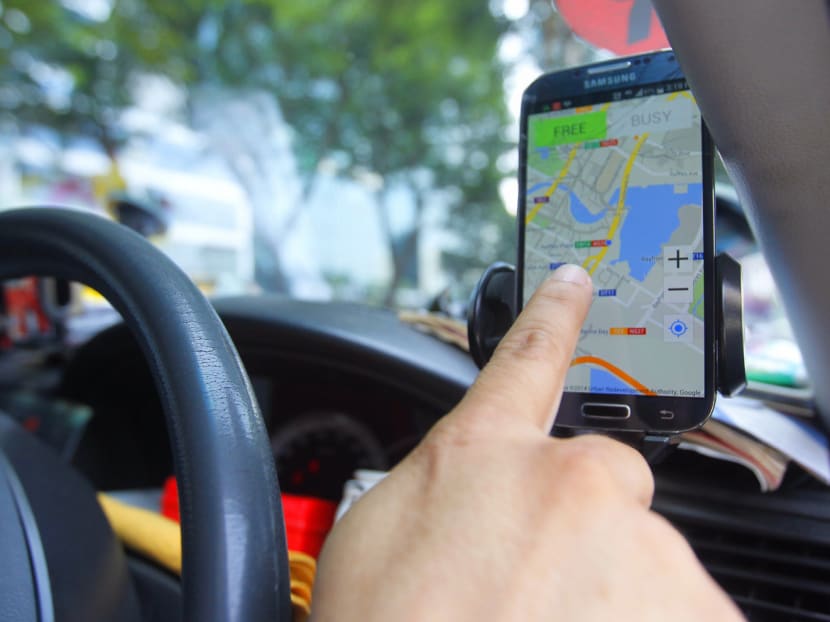New rules for third-party taxi booking services
SINGAPORE — With the explosive growth of third-party taxi booking apps here, the Land Transport Authority (LTA) has laid down the rules for the first time to govern a burgeoning industry that has seen an influx of companies jostling for a piece of the pie over the past year.

Hailo, a privately-owned app based taxi service, works with public transport operator SMRT. TODAY file photo
SINGAPORE — With the explosive growth of third-party taxi booking apps here, the Land Transport Authority (LTA) has laid down the rules for the first time to govern a burgeoning industry that has seen an influx of companies jostling for a piece of the pie over the past year.
Yesterday, the LTA announced details of a basic regulatory framework expected to take effect in the second quarter of next year after the necessary legislative processes are completed.
Under the new framework, all third-party taxi booking services are required to register with the authority to operate here. Successful applicants will be granted a certificate of registration that is valid for three years.
Among other rules, all third-party taxi booking services must provide commuters with payment details, including flag-down fare, distance and time rates, the booking fee charged by the service provider and, where applicable, peak period and location surcharges.
Bidding and pre-trip tipping for taxi services will not be allowed and the booking fees charged by the apps cannot exceed the taxi operators’ booking fees. Also, all third-party taxi booking services can despatch only licensed taxis and drivers holding valid Taxi Driver’s Vocational Licences.
These services cannot require commuters to specify their destinations before they make their bookings.
Basic customer support services must be provided, including lost-and-found services and avenues for commuters to raise queries and complaints.
An LTA spokesperson said penalties for breaches or non-compliance will be capped at S$100,000 per contravention, similar to the taxi service operator licence regime. In severe cases, the registration may be revoked.
Noting the increasing popularity of the apps, the LTA said the regulations were introduced to safeguard commuter safety and interests. It followed extensive consultation with commuters, third-party taxi booking services, taxi companies and the National Taxi Association (NTA) over the past year, the authority added.
Since Malaysia-based GrabTaxi launched its taxi-booking app here in October last year, three other companies — all based overseas — have started operations here: Brazil’s Easy Taxi, the United States’ Uber and the United Kingdom’s Hailo, which is working with public transport operator SMRT.
When contacted, all four companies said they welcomed the regulations. Uber regional general manager for South-east Asia Mike Brown noted that the LTA has generously given a significant amount of time for companies to comply with the regulations before they go into effect. “In fact, Uber is already compliant with the proposed framework,” he said.
GrabTaxi general manager Lim Kell Jay said third-party booking apps are now seen as a legitimate service that benefits commuters.
He added that GrabTaxi will remove its requirement for commuters to state their destinations before they make bookings, when the framework takes effect.
Nanyang Technological University (NTU) associate professor Gopinath Menon said the framework is the first step towards removing confusion among some customers on how much to pay as fees and surcharges vary among the apps.
Given that the LTA has less of a hold over app firms compared with public-transport operators, Dr Menon said full enforcement of the regulations may not be possible.
“The commuters have a role as a watchdog to ensure that the system works as expected.”
Still, Dr Park Byung Joon, SIM University’s head of programme for Urban Transport Management, pointed to the LTA’s powers to revoke registration if the breaches are severe. He added that the authorities can do an audit on a sample group of drivers to assess if any rules are broken.
NTA adviser Ang Hin Kee, who had advocated for rules to govern the apps, said some form of regulation is important, but he felt that the framework should be enforced with a light touch to allow the market to evolve.
Mr Ang, who is a Member of Parliament for Ang Mo Kio, said some rules, such as prohibiting apps from requiring customers to specify their destinations, were too conservative.
Given that customers can easily stop using poor-performing apps, there could be flexibility to allow taxi app firms to innovate and come up with solutions to better match supply to demand, he said.







